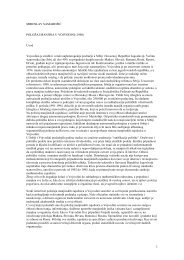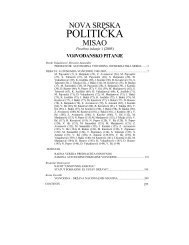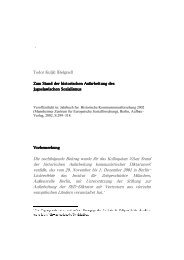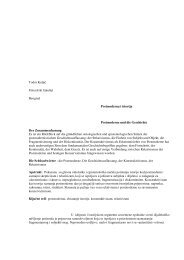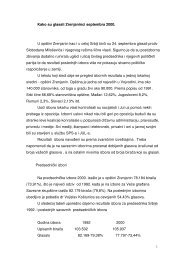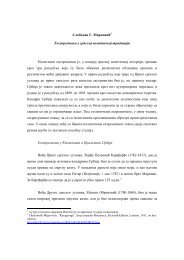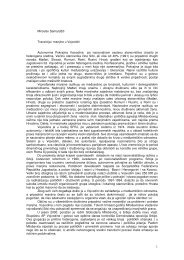Todor Kuljić TITO -sociološkoistorijska studija- (Drugo ... - Početak
Todor Kuljić TITO -sociološkoistorijska studija- (Drugo ... - Početak
Todor Kuljić TITO -sociološkoistorijska studija- (Drugo ... - Početak
Create successful ePaper yourself
Turn your PDF publications into a flip-book with our unique Google optimized e-Paper software.
summarizes Titos understanding of the party, character of the party purges, the role of the army,<br />
ruling techniques, and finally the patterns of the power justification. It also draws, a distinction<br />
between the stages in which the communist political culture urged modernization from those in<br />
which it started to block modernization.<br />
Tito’s national policy is a variant of modern and democratic idea of Balkans as one indivisible<br />
state entirety. This is a subject matter of Chapter 6. which highlights Titos successful effort and<br />
failures in the attempt of cosmopolitization of the Balkans. This Chapter also discusses the role<br />
of the Yugoslav national idea, outlines the main economic causes of nationalism in the<br />
socialistic Yugoslavia, and summarizes Titos extraordinary active super-national role. This last<br />
element figures as a rather successful and progressive attempt of cosmopolitanization of the<br />
Balkans, exemplary of the leftist spirit of the epoch. The british historian Taylor called Tito<br />
“the last Habsburg” because he ruled a country with eight major ethinic groups, gave them<br />
“cultural autonomy”, and restrained their sesessionist antagonism. Judging by its multiethnic<br />
structure, Tito’s Yugoslavia was, no doubt, most similar to the Austro-Hungarian Empire, but<br />
the integrative ideas (Marxism and Catholicism) were essencially different. Here are discussed<br />
the international and cosmopolitian implications of Marxism in the pacification of an explosive<br />
Balkan space. From the standpoint of long-term historical processes, the Chapter 7. ‘Titos<br />
foreign policy” discusses this policy as a rare example of relatively successful and independent<br />
break through of the hierachical relationship in the international order, and of the unavoidable<br />
hierarchical subordination of small countries to the interests of great powers. Also outlined are<br />
the main stages of Titos foreign policy built on the principles of equidistance, with a special<br />
focus on the threee crisis in the Yugoslav-Soviet relationship, and then the relationship with the<br />
West and the non-alignment policy.<br />
The following 8. Chapter “Structure and Funktion of Titos authority, charisma and cult” gives a<br />
dialectic analysis of the progressive- modernizing, and of the conservative functions of Titos<br />
charisma. His charisma neutralized tensions of an ethnically mixed and explosive region, while<br />
in the sphere of foreign policy Titos personal authority contributed to building up the states<br />
ranking. The party leader and head of state was a symbol of the radical change in the social<br />
structure, i. e. the acceleration of horizontal and vertikal mobility, which is an important aspect<br />
of modernization. The undoubtedly progressive active role of Tito’s charisma in mobilizing the<br />
resistance to fascism and stalinism has already beeen mentioned. Accelerated post-war<br />
development was faciliated by the state’s and Tito’s respectability in the whole world. But here<br />
are not also the conservative sides of Titos cult neglected. Uncritical elevation and admiration<br />
of Tito as a leader of a monopolistic party with no competition caused fast an irrational<br />
relationship of idolatry for an infallible individual and developed an illusion of his role of<br />
savior. The basically rationalistic marxist ideology was the important defense against Tito’s<br />
irrational deification. Here are broader discussed the forms of Tito’s deification and compared<br />
with Stalin’s cult.<br />
Chapter 9. treats the relationship of the Yugoslav intelligentsia towards Tito. Here are<br />
presented the chief patterns of relationship of creative intellectuals towards Tito: (1)<br />
M.Krleža’s glorification of Tito, stemming from the Croatian tradition of the Yugoslav<br />
national idea, (2) demonization of Tito by D.Ćosić and Serbian nationalism,and (3)<br />
differentiated judgment by M.Djilas that sprang from the non-national liberal critics of<br />
Bolshevism. Krleža’s glorification of Tito was deeper than Ćosić,s demonization, and together<br />
with Djilas’s differentiated judgement, it makes an interesting testimony about the relationship<br />
of the relationship of the intellectuals contemporaries, toward Tito.<br />
Chapter 10. “Tito in the new Serbian memory” treats the memory of Tito in historical science,<br />
political ideologies and living oral memory. In the post-communist age historians are busy<br />
with excavating national pasts. The cold memory of Tito is unacceptable in the reconstitution<br />
of a national collective memory. In the context of a new post-communist myth of national<br />
salvation Tito is instrumentalised as a symbol of political evil. In the official memory of the<br />
main former Yugoslav republics he is redundant or unacceptable. But on the other side, in the<br />
Yugo-nostalgic people’s memory and in living oral memory he is still a positive person. After<br />
227



